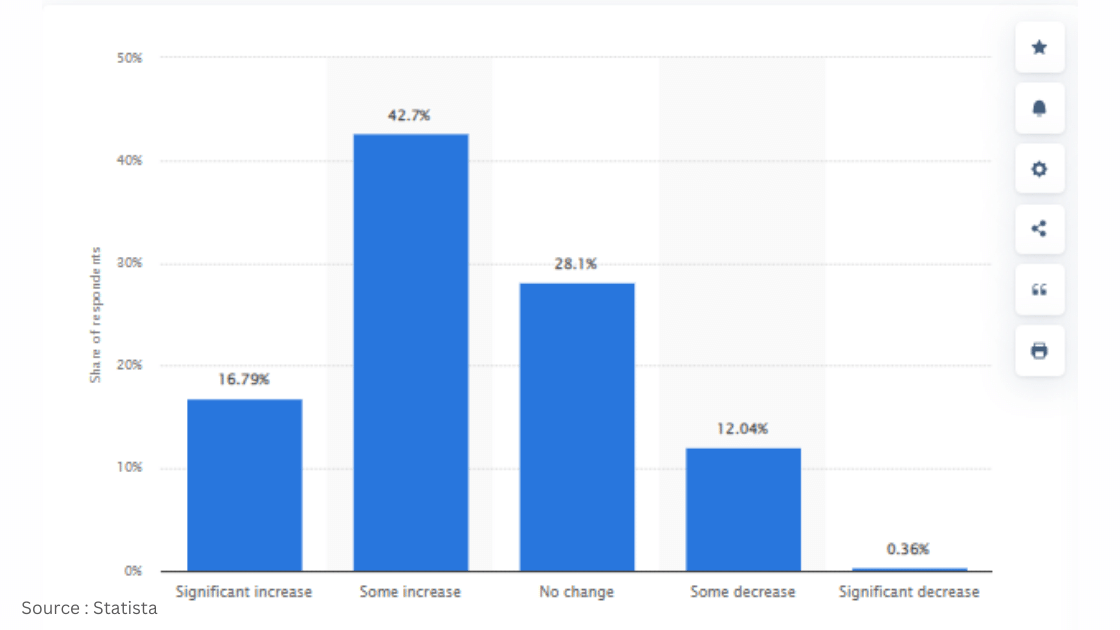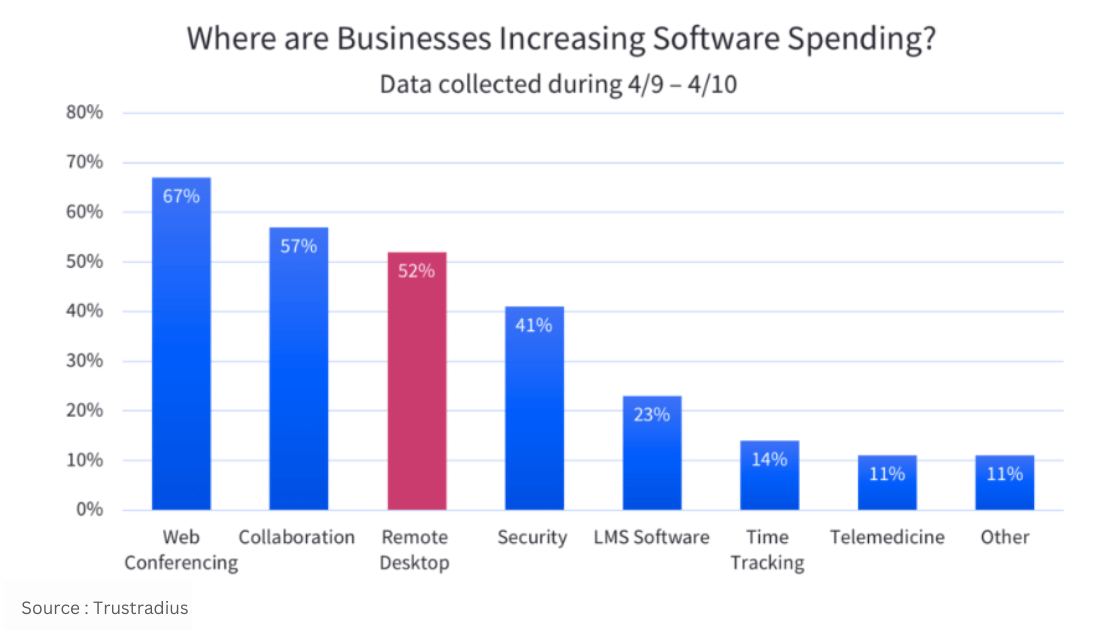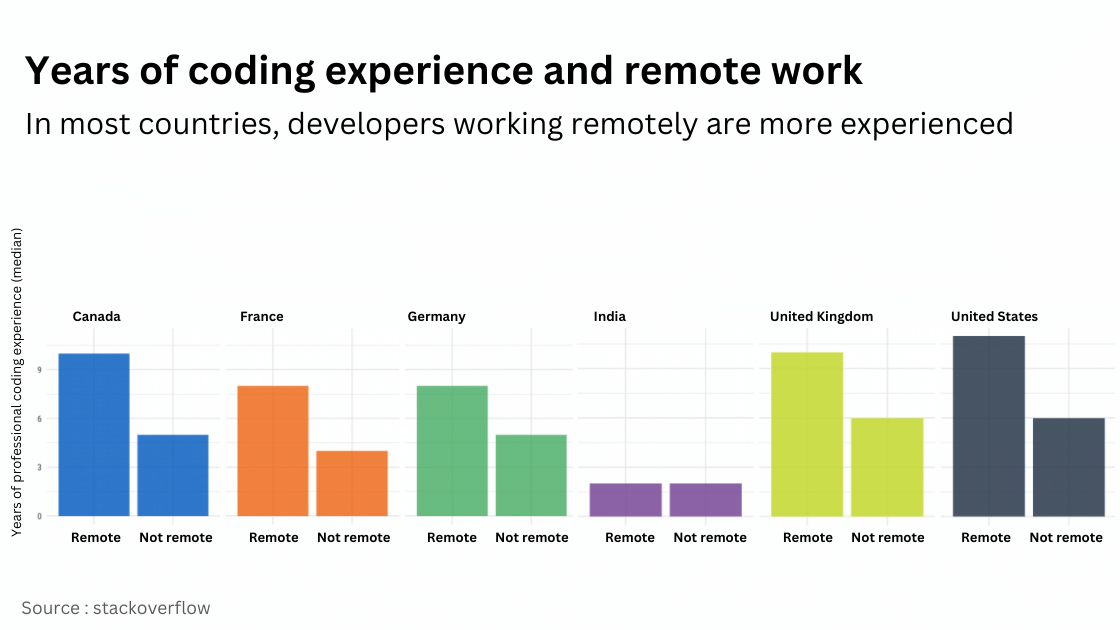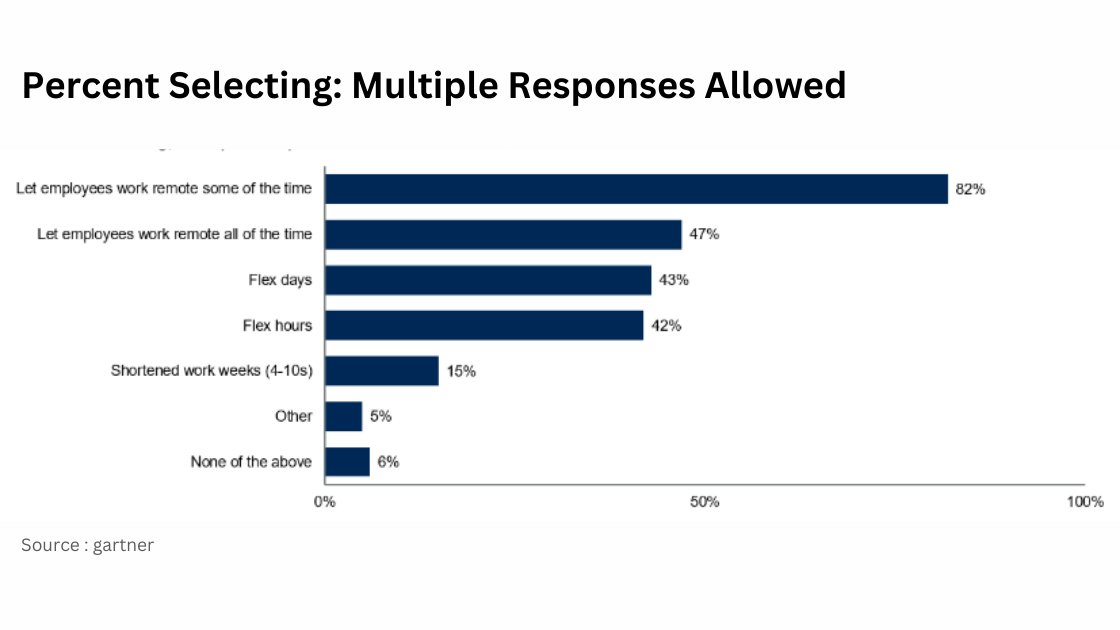Can you believe it? A whopping 86% of developers have taken on the work-from-home culture and are currently working remotely!
This pattern has caught the attention of the development world, particularly in the aftermath of the epidemic.
Incredible research shows that since the onset of remote work enforced by COVID-19, approximately 42% of respondents from a global survey have seen some increase in software developers’ productivity.
In fact, about 59.5% of respondents report that remote work setups have had a positive impact on developer productivity.
 And get this, businesses lose a staggering $600 billion a year to workplace distractions, but remote workers are 35-40% more productive than their in-office counterparts.
And get this, businesses lose a staggering $600 billion a year to workplace distractions, but remote workers are 35-40% more productive than their in-office counterparts.
This has caused a huge increase in the demand for remote software engineers, and most developers are eager to continue working remotely in the future.
This incredible trend has completely revolutionized the IT industry, as professionals have come to appreciate the time and cost-saving benefits of remote work.
So, why not join the trend and explore the reasons why you should consider hiring remote software developers for your business?
Top Reasons Why Business Owners Should Hire Remote Software Developers
You wouldn’t blindly follow the trend of hiring remote software developers without considering their suitability for your business, right?
So, let’s help you in breaking down things for yourself- first off, what are the benefits of hiring remote developers? This means we will discuss the top reason why it is a good decision.
And then, we’ll tackle the burning question: why would you NOT want to hire remote developers?
Benefits Of Hiring Remote Software Developers
When you hire remote software developers, you gain access to a myriad of remarkable benefits that can propel your business forward. Let’s delve into these advantages and explore how collaborating with remote software engineers or a remote software development team can optimize your approach and strategize effectively.
- Operational Expenses are Significantly Reduced:
According to Global Workplace Analytics, hiring remote employees for 2-3 days a week can result in an annual saving of $11,000 per employee.
By opting for remote software engineers, you can save a fortune on office space, utility bills, amenities, and transportation charges. Remote software developers utilize their own resources, leading to substantial cost savings for your company.
- Access to a Global Talent Pool:
The scarcity of skilled workers, particularly experienced coders, is a huge concern for companies today. Thankfully, remote working enables businesses to recruit the best software developers from anywhere on the globe. Thus, why more than 50% of companies anticipated increasing their spending on remote desktop software.

This offers an immense pool of diverse abilities, so companies can build remote software development teams precisely fitted to their specifications. With the capacity of remote work, businesses can quickly locate and engage with the greatest minds in the world.
- A Boon to Your DEI Strategy:
Bringing in remote software engineers is a significant stride in developing a highly diversified and open workspace. It has been observed that developers working remotely are more experienced in the majority of countries.

By removing geographic boundaries, companies can enlist talented programmers from different countries with various cultural and educational backgrounds.
Integrating assorted outlooks into the development procedure can lead to enhanced imagination and originality, which can eventually support market expansion and unleash your organization’s capacity.
- Flexible Resource Allocation:
Hiring remote software developers provides scalability options to meet project demands. Whether it’s urgent projects or fluctuating resource needs, remote developers can be easily hired, offering better skills at lower costs compared to hiring in-house staff.
Scaling down the team is also more manageable with remote software engineers if the need for resources decreases.
- Continuous Workflow:
With remote software engineers, your team can function 24/7, ensuring a continuous workflow and faster development processes. This round-the-clock availability enables quicker product launches, giving you a competitive advantage.
Handling customer issues and requests becomes more efficient, especially when your remote team operates in different time zones. Regular meetings and overlapping schedules allow for development progress and instant resolution of technical hiccups.
- Higher Productivity:
Working with remote software engineers in today’s highly productive world proves advantageous. According to a recent survey by Indeed, 72% of enterprises implementing remote working policies reported a more productive workforce.
Remote developers thrive in suitable environments where they can choose the most focused time and place to work. Developers can organize their day to function effectively, working during their most productive hours rather than adhering to a strict 9-5 schedule.
- Unaffected by Covid-19-like Situations:
The future of work lies in remote working, especially in situations like pandemics that can have a massive impact on businesses that haven’t embraced digitalization.
Remote software developers remain unaffected by epidemics, lockdowns, and emergencies, as they can easily accommodate a work-from-home environment, ensuring business continuity. Thus, nearly half (47%) of employers stated they would soon permit employees to work remotely full-time.

- Plethora of Creative Ideas for Projects:
Remote developers are well-equipped to juggle multiple projects at once, which enables them to benefit from a variety of perspectives and think critically and innovatively.
As a result, collaborating with these individuals opens up the possibility of new solutions that could benefit the entire team and drive projects to greater success.
- Allows Focus on Core Business:
By tapping into the expertise of remote developers, designers, or QA specialists, non-technical founders, and entrepreneurs can enjoy much-needed flexibility in their ventures.
This gives business owners the opportunity to concentrate on fundamental facets such as:
- marketing, sales
- customer relations
- business development
Ultimately resulting in greater success with less stress.
- Augment the In-House Development Team:
Remote software engineers provide essential support to internal teams, contributing technical skills and knowledge to bolster their efforts. They can bridge the skill gap between the current in-house personnel, freeing them from mundane tasks and enabling them to devote more energy to difficult challenges.
When Not To Hire Remote Software Developers?
While remote work offers many advantages, it’s crucial to consider the unique circumstances that may warrant a different approach to ensure the success of your projects. Let’s explore scenarios when hiring remote developers may not be the optimal decision:
- Lack of communication and collaboration:
Projects that depend on frequent direct contact, team collaboration, and quick response times are better handled with local personnel.
In some cases, instantaneous responses, active idea-sharing, and practical team participation may not be possible when operating with remote developers.
- Confidentiality and security concerns:
Working with remote developers can present difficulties for organizations dealing with sensitive data and require a high level of security, such as governmental agencies.
As it can be difficult to exercise the same degree of control and security protocols when personnel is not on-site, it can result in increased potential for security breaches.
- Limited infrastructure and technical requirements:
For remote software developers to be effective in their roles, reliable internet, necessary hardware, and appropriate software infrastructure must be in place.
If a business is in an area with poor internet access or without the proper technical infrastructure for remote working, hiring remote developers may not be a realistic option.
- Need for immediate physical presence:
For projects or tasks that need troubleshooting, equipment setup, or maintenance, having an on-site developer would be ideal, as remote developers may not always be able to provide necessary in-person assistance.
- Cultural and language barriers:
For companies whose target markets are limited to certain regions with their own distinct cultural and linguistic features, utilizing remote developers who lack knowledge of the unique audience could be a hindrance.
On the contrary, hiring local developers who understand the culture and language of the area may give your business the upper hand.
Now, one question that may be on your mind is – how hiring remote software developers is different from hiring freelance software developers.
Remote Software Developers Vs. Freelance Software Developer
| Hiring Remote Developers | Freelancers | |
| Cost | Higher cost | Lower cost |
| Control | More control | Less control |
| Skillset | A broad range of skills | Specific skills |
| Availability | Longer-term commitment | Short-term commitment |
| Team Integration | Easier integration | Limited integration |
| Communication | Direct communication | Communication may vary |
| Supervision | Easier to supervise | Less supervision required |
| Scalability | Easily scalable | Limited scalability |
| Accountability | Higher level of accountability | Variable accountability |
| Long-Term Partnership | Potential for long-term partnerships | Project-based engagements |
How To Hire Remote Software Developers?
If you are looking for remote software developers for your project, here are some quick steps you can follow;
Step 1: Define Project Requirements
Begin by clearly defining the scope of your project and identifying your recruitment needs.
- Will you need a full-time or part-time developer?
- What skills and experience are necessary for the project?
- What technologies will the developer be working with?
Determine the product, features, and functionality you wish to build, your target audience, the desired technologies to be used, and the desired timeline for the project. And, even get to know the number of developers required for the project.
Step 2: Evaluate the Software Development Landscape
Well, before you start Googling like crazy, let me give you a piece of advice. You should evaluate the software development landscape in India, mate! Why, you ask? Because you want to find the perfect location to hire a remote software developer from.
And to do so, you must consider various factors, such as
- the availability of resources in the specific tech stack you need
- the number of readily available resources
- their experience and industry knowledge,
- And of course, the cost of hiring resources.
Based on these critical variables, select the best city in India. You can even investigate another location, however many organizations from Europe and the United States are willing to hire a more experienced software engineer in India.

Step 3: Find Candidates
Why limit your search for remote software development teams or candidates to just one source when you can utilize multiple outlets? Yes, heard right.
Explore job portals or even advertise detailed job profiles with specific requirements. And, you can scroll through various freelancer portals for short-term hiring options. But why stop there when you can also tap into the power of social networking sites like
- Stack Overflow
Alternatively, consider reaching out to reputable offshore development companies like ScalaCode for access to a pool of pre-vetted developers. Here, you can hire remote software developers for all your needs.
Step 4: Develop a Hiring Funnel
Let’s get down to business and create a hiring framework that will make the recruitment process a breeze. You need to think step-by-step here, from screening applications to shortlisting, assessments, and final selection.
To keep things fair and consistent, you need to establish crystal-clear criteria for evaluating remote software engineers at each stage. That is how you will know you are choosing the cream of the crop.
Step 5: Start the Screening Process
Thoroughly screen the applications of candidates you receive from various sources. Evaluate their skills, knowledge, qualifications, and past experience to determine if they are a good fit for your organization. Shortlist candidates who meet the initial criteria for further consideration.
Step 6: Evaluate Programming Competency
Assess the programming competency of shortlisted candidates by conducting coding exams or tests. Utilize online platforms designed for evaluating developers’ practical skills under different work scenarios. This will help you assess their coding abilities and teamwork skills.
Step 7: Assess Soft Skills
Conduct interviews to assess the soft skills of candidates who have passed the technical assessments. Evaluate their communication abilities, level of politeness, sense of ownership, and willingness to learn. These soft skills are crucial for successful collaboration in a remote working environment.
Step 8: Selection and Onboarding Process
Once you have identified the developers you wish to hire, finalize the terms of engagement, including remuneration, the scope of work, timelines, milestones, and legal aspects such as NDAs and contracts. Ensure clear communication and understanding before onboarding the developers onto your project.
By following these eight steps, you can effectively hire remote software developers from India who align with your software development goals. Keep in mind that while hiring, consider factors such as cultural fit, work ethics, and long-term collaboration potential for a successful partnership.

How ScalaCode Help You Hire Remote Software Developers?
As a leading IT company, we provide top-notch software development and consulting services. Our experienced and certified developers are knowledgeable in a variety of programming languages and technologies. Furthermore, there’s no need for bidding to hire remote developers from us.
We will present a list of developers in line with your criteria. Then, you will be able to engage in one-on-one conversations to gain insights into their skills and background. What’s more, when you contract remote developers through us, you will receive a multitude of benefits, including
- Dedicated project manager
- 24/7 support
- Quick onboarding process
- Strict NDAs
FAQs
Q. How much does it cost to hire remote software developers?
Ans. The cost of hiring remote software developers varies depending on the location, experience, and skills of the developer. However, in general, the average cost to hire a remote developer would range somewhere between $10,000-$150,000. We have breakdown the cost to hire remote software developers as per different
| Factor | Range |
| Developer’s location | |
| India | $10 – $50 |
| Eastern Europe | $25 – $75 |
| Western Europe | $50 – $95 |
| United States | $75 – $150 |
| Developer’s experience | |
| Junior | $5 – $20 |
| Mid-level | $20 – $40 |
| Senior | $40 – $60 |
| Developer’s skills | |
| General | $15 – $35 |
| Specialized | $30 – $95 |
| Project size and complexity | |
| Small and simple | $10,000 – $30,000 |
| Medium | $30,000 – $80,000 |
| Large and complex | $80,000 – $1,50,000+ |
Q. Why hire remote developers from Indian companies?
Ans. Hiring remote developers from Indian companies comes with a variety of advantages. Primarily, you can enjoy savings on labor costs due to India’s comparatively low cost of living.
Additionally, the nation boasts an expansive pool of highly skilled software developers, providing access to excellent talent. Besides, having remote software development teams from around the world gives you access to round-the-clock support on your project.
Q. What are the benefits of hiring remote developers?
Ans. The advantages of hiring remote developers are plentiful; cost savings, access to a worldwide talent pool, and the freedom to source the highest quality developer for the job, regardless of their geographic location. Furthermore, the expense associated with a remote developer is often substantially less than that of an in-house developer.
Q. What are the pros and cons of hiring remote developers?
Ans. Pros and cons of hiring remote developers:
Pros:
- Cost savings
- Access to global talent
- Flexibility
- Increased productivity
- Improved communication
Cons:
- Communication challenges
- Cultural differences
- Lack of trust
- Lack of visibility
Q. What is 100% remote work?
Ans. 100% remote work is a work arrangement where employees work from home or a remote location 100% of the time.
Q. What is remote work in software?
Ans. Software engineering done remotely involves a team of coders collaborating on projects without the need to be physically in the same space.
Q. Why remote software development is getting so popular?
Ans. Due to the increased prevalence of the internet and cloud computing, remote software development has become an attractive option for many as it simplifies the process of collaborating with one another from separate locations.
- The cost savings associated with remote work are attractive to businesses.
- The talent pool of remote developers is growing rapidly.
- Remote work offers employees more flexibility and work-life balance.




